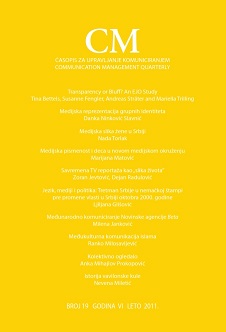Medijska pismenost i deca u novom medijskom okruženju
Media Literacy and Children in New Media Environment
Author(s): Marijana MatovićSubject(s): Media studies, School education, Social development, Social Informatics, Sociology of Education
Published by: Fakultet političkih nauka Univerziteta u Beogradu
Keywords: children; media; Internet; literacy; media education; education;
Summary/Abstract: The aim of this paper is to point out the changes in media literacy concept from its establishment until today, and to disambiguate ongoing academic debate about meaning of media literacy and its distinction from concept of media education. Concept of media literacy is in process of redefinition, which will be discussed in this paper on three levels of analysis. First level is chronological overview of literacy development through decades, following development of different media. Second level considers changing of media education curricula introduced with progress of Internet penetration. The last level is related to transformations in the educational process framework that is encouraged with the new, interactive media. In spite of the ongoing academic and social dispute about concept of media literacy, most scholars and authority figures stress its important role in contemporary world. Although concept refers to all citizens, this work is focused on children, as most sensitive members of society whose cognitive potential is not fully developed. Therefore they are most vulnerable to the influence of both traditional and new media. New communication technologies are transforming the way in witch children play, socialize, learn and participate in peer communities. However, new possibilities are followed with new risks and potential dangers of which parents are usually unaware of. Although society has developed more or less successful mechanisms to protect children from ‘old’ media influences, Internet is still far from being children friendly environment. That’s why international policy makers and academic community are calling upon necessity for continuous learning in society at large not just among children and parents as most needy for media literacy.
Journal: CM Komunikacija i mediji
- Issue Year: 6/2011
- Issue No: 19
- Page Range: 53-66
- Page Count: 14
- Language: Serbian

